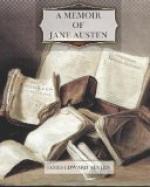’I shall write to Charles
by the next packet, unless you tell me in
the meantime of your intending to
do it.
’Believe me, if you chuse,
‘Yr affte Sister.’
Jane did not estimate too highly the ‘Cousin George’ mentioned in the foregoing letter; who might easily have been superior in sense and wit to the rest of the party. He was the Rev. George Leigh Cooke, long known and respected at Oxford, where he held important offices, and had the privilege of helping to form the minds of men more eminent than himself. As Tutor in Corpus Christi College, he became instructor to some of the most distinguished undergraduates of that time: amongst others to Dr. Arnold, the Rev. John Keble, and Sir John Coleridge. The latter has mentioned him in terms of affectionate regard, both in his Memoir of Keble, and in a letter which appears in Dean Stanley’s ‘Life of Arnold.’ Mr. Cooke was also an impressive preacher of earnest awakening sermons. I remember to have heard it observed by some of my undergraduate friends that, after all, there was more good to be got from George Cooke’s plain sermons than from much of the more laboured oratory of the University pulpit. He was frequently Examiner in the schools, and occupied the chair of the Sedleian Professor of Natural Philosophy, from 1810 to 1853.
Before the end of 1805, the little family party removed to Southampton. They resided in a commodious old-fashioned house in a corner of Castle Square.
I have no letters of my aunt, nor any other record of her, during her four years’ residence at Southampton; and though I now began to know, and, what was the same thing, to love her myself, yet my observations were only those of a young boy, and were not capable of penetrating her character, or estimating her powers. I have, however, a lively recollection of some local circumstances at Southampton, and as they refer chiefly to things which have been long ago swept away, I will record them. My grandmother’s house had a pleasant garden, bounded on one side by the old city walls; the top of this wall was sufficiently wide to afford a pleasant walk, with an extensive view, easily accessible to ladies by steps. This must have been a part of the identical walls which witnessed the embarkation of Henry V. before the battle of Agincourt, and the detection of the conspiracy of Cambridge, Scroop, and Grey, which Shakspeare has made so picturesque; when, according to the chorus in Henry V., the citizens saw




